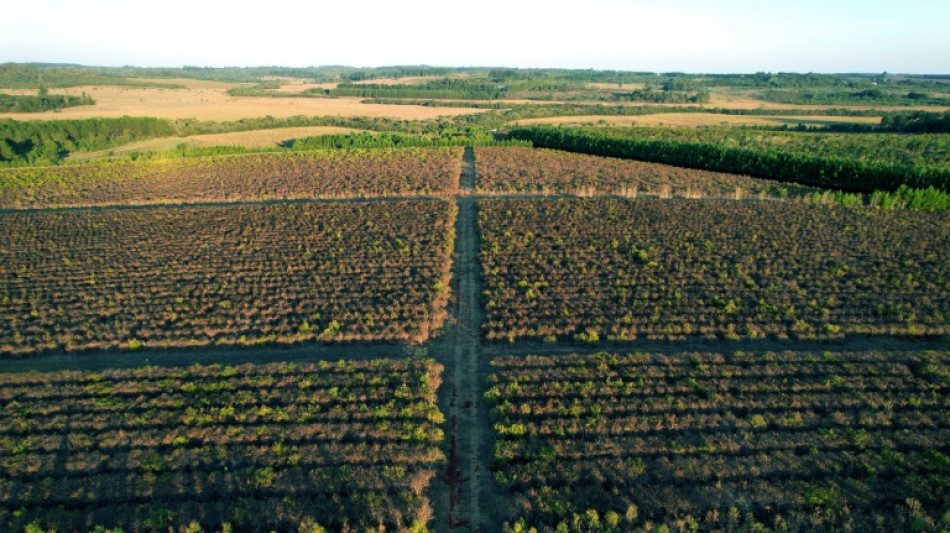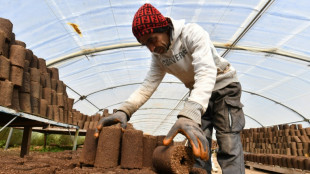
-
 Saka 'ready to go' after long injury lay-off: Arteta
Saka 'ready to go' after long injury lay-off: Arteta
-
Ingebrigtsen Sr, on trial for abusing Olympic champion, says he was 'overly protective'

-
 Tourists and locals enjoy 'ephemeral' Tokyo cherry blossoms
Tourists and locals enjoy 'ephemeral' Tokyo cherry blossoms
-
Khamenei warns of 'strong' response if Iran attacked

-
 France fines Apple 150 million euros over privacy feature
France fines Apple 150 million euros over privacy feature
-
UK PM urges nations to smash migrant smuggling gangs 'once and for all'

-
 Thai authorities probe collapse at quake-hit construction site
Thai authorities probe collapse at quake-hit construction site
-
France's Le Pen convicted in fake jobs trial

-
 Chinese tech giant Huawei says profits fell 28% last year
Chinese tech giant Huawei says profits fell 28% last year
-
Trump says confident of TikTok deal before deadline

-
 Myanmar declares week of mourning as hopes fade for quake survivors
Myanmar declares week of mourning as hopes fade for quake survivors
-
Japan's Nikkei leads hefty market losses, gold hits record

-
 Tears in Taiwan for relatives hit by Myanmar quake
Tears in Taiwan for relatives hit by Myanmar quake
-
Venezuela says US revoked transnational oil, gas company licenses

-
 'Devastated': Relatives await news from Bangkok building collapse
'Devastated': Relatives await news from Bangkok building collapse
-
Arsenal, Tottenham to play pre-season North London derby in Hong Kong

-
 Japan's Nikkei leads hefty equity market losses; gold hits record
Japan's Nikkei leads hefty equity market losses; gold hits record
-
Israel's Netanyahu picks new security chief, defying legal challenge

-
 Trump says US tariffs to hit 'all countries'
Trump says US tariffs to hit 'all countries'
-
Prayers and tears for Eid in quake-hit Mandalay

-
 After flops, movie industry targets fresh start at CinemaCon
After flops, movie industry targets fresh start at CinemaCon
-
Tsunoda targets podium finish in Japan after 'unreal' Red Bull move

-
 French chefs await new Michelin guide
French chefs await new Michelin guide
-
UK imposes travel permit on Europeans from Wednesday

-
 At his academy, Romanian legend Hagi shapes future champions
At his academy, Romanian legend Hagi shapes future champions
-
Referee's lunch break saved Miami winner Mensik from early exit

-
 Djokovic refuses to discuss eye ailment after shock Miami loss
Djokovic refuses to discuss eye ailment after shock Miami loss
-
Mitchell magic as Cavs bag 60th win, Pistons and T'Wolves brawl

-
 Mensik shocks Djokovic to win Miami Open
Mensik shocks Djokovic to win Miami Open
-
Duterte lawyer: 'compelling' grounds to throw case out

-
 What happens on Trump's 'Liberation Day' and beyond?
What happens on Trump's 'Liberation Day' and beyond?
-
Clock ticks on Trump's reciprocal tariffs as countries seek reprieve

-
 Japan-Australia flagship hydrogen project stumbles
Japan-Australia flagship hydrogen project stumbles
-
Musk deploys wealth in bid to swing Wisconsin court vote

-
 Mensik upsets Djokovic to win Miami Open
Mensik upsets Djokovic to win Miami Open
-
China manufacturing activity grows at highest rate in a year

-
 'Waited for death': Ex-detainees recount horrors of Sudan's RSF prisons
'Waited for death': Ex-detainees recount horrors of Sudan's RSF prisons
-
Japan's Nikkei leads big losses in Asian markets as gold hits record

-
 Rescue hopes fading three days after deadly Myanmar quake
Rescue hopes fading three days after deadly Myanmar quake
-
'Basketbrawl' as seven ejected in Pistons-Wolves clash

-
 Four men loom large in Microsoft history
Four men loom large in Microsoft history
-
Computer pioneer Microsoft turns 50 in the age of AI

-
 Trump calls out both Putin and Zelensky over ceasefire talks
Trump calls out both Putin and Zelensky over ceasefire talks
-
Kim Hyo-joo tops Vu in playoff to win LPGA Ford Championship

-
 Economy and especially Trump: Canadians' thoughts on campaigns
Economy and especially Trump: Canadians' thoughts on campaigns
-
Liberal PM Carney takes lead four weeks before Canada vote

-
 SpaceX to launch private astronauts on first crewed polar orbit
SpaceX to launch private astronauts on first crewed polar orbit
-
Australia open door for Kerr's return as Matildas captain

-
 The Premier League's unlikely pretenders to Champions League riches
The Premier League's unlikely pretenders to Champions League riches
-
IFabric Corp Reports Record Q4 and Full Year 2024 Revenues and Strong Profitability


Restoring damaged land key to climate, biodiversity goals
Unsustainable farming is on track to increase the amount of severely degraded land by an area the size of South America by mid-century, a UN report warned Wednesday, as experts said restoration was a matter of "survival".
Global food systems are responsible for 80 percent of deforestation and 70 percent of freshwater use, said the report.
They are also the single largest driver of species extinction, which is occurring 100 to 1,000 times more rapidly today than when human activity began to radically change the climate and degrade nature.
"The risk of widespread, abrupt or irreversible environmental change will grow," the Global Land Outlook 2 report warns.
The 40 percent of Earth's non-frozen land denatured by chemical-intensive exploitation threatens roughly half of global GDP, some $4 trillion, according to the 250-page peer-reviewed assessment, which called for action "on a crisis footing".
"How we manage and use land resources is threatening the health and continued survival of many species on Earth, including the human species," Ibrahim Thiaw, Executive Secretary of the UN convention charged with reversing land degradation told AFP.
"Business as usual is not a viable pathway for our continued survival and prosperity."
The flagship report of the UN Convention to Combat Desertification (UNCCD) comes two weeks before the treaty's 197 parties meet for the first time in three years, in Abidjan.
Adapting to an increase in drought and transitioning to sustainable agriculture top an agenda more broadly focused on restoring the health of one of Earth's vital resources: land.
- Agriculture's 1% -
At least 70 percent of ice-free land on Earth has been converted to human use, and most of that has been degraded. That means that things do not grow as much or as well as they used to.
"There's not a lot of land left," UNCCD chief scientist Barron Orr told AFP. "And yet, we still see an accelerated rate of land use change taking place."
The report reveals a startling level of concentration in the production of food.
At one extreme, one percent of agribusinesses control 70 percent of the world's agricultural land. At the other extreme, 80 percent of farms comprise only 12 percent of all farmland.
"The solution, at least in the initial phase, is not going to be converting land back to small holders," said Orr.
"It's making sure we move large agriculture into a much more sustainable space."
- Climate and nature -
The UN Paris Agreement's cornerstone climate goal is capping global warming below two degrees Celsius, and the biodiversity convention is aiming later this year to carve out 30 percent of Earth's surface as protected areas.
For the desertification convention, the core goal is "land degradation neutrality" by 2030.
Behind the cumbersome name is a simple concept that can be summed up as "no net loss": to ensure that, by 2030, the amount of degraded land in a given country has not expanded compared to a 2015 baseline.
Previously, the international response has been bogged down in arguments about metrics.
That problem hampered progress on the Great Green Wall, an ambitious, multi-decade scheme to reclaim agricultural land from the desert along the Sahel stretching 7,000 kilometres (more than 4,000 miles) from the Atlantic Ocean to the Red Sea.
Countries could not agree on how to monitor and measure progress. But the new benchmark is far easier to apply, said Orr.
- Competing for land -
The report contrasts different development scenarios out to mid-century.
A "business-as-usual" approach would see an additional 250 billion tonnes of CO2 or its equivalent released into the atmosphere by 2050 -- roughly four times current annual greenhouse gas emissions from all sources.
But a strategy of land restoration and protection could see the opposite: some 300 billion tonnes safely stored in soil and vegetation compared to a 2015 baseline -- equivalent to five years of current emissions.
Competition for land is heating up and there will be increasingly hard choices in the future over whether to carve out land for commodity crops, growing more food, C02-absorbing plantations, or to preserve as biodiversity corridors.
"We have to really think about that much more strategically," said Orr.
The report recommends for the first time scaling up the land rights of indigenous peoples as a climate solution and to ensure the success of projects to restore nature.
But indigenous groups, often shunted aside or pushed off their traditional homelands in the past, remain wary.
"We welcome new allies to this battle, including economic actors who are increasingly interested in avoiding climate risk, but we must make clear that we will not be used for greenwashing," said Jose Gregorio Diaz Mirabal, representing 511 indigenous groups in the Amazon basin.
"Partnering with Indigenous peoples requires embracing transformative change."
P.Silva--AMWN

